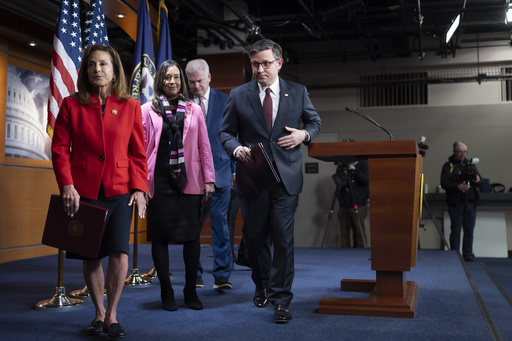NEW YORK — President Donald Trump is pushing the envelope of how far Republicans will go to endorse his aggressive “Make America Great Again” initiatives. His approach includes dismantling federal agencies and making decisions that contradict traditional GOP values.
At present, Republicans are mostly standing united. They support Cabinet choices with controversial backgrounds, overlook his halting of appropriated spending, and defend policies that would have raised alarms if they originated from Democrats. “They’re pushing the envelope of what their power looks like. It’s a normal part of a transition,” noted Sen. Thom Tillis from North Carolina.
While some dissenting voices have emerged, the internal Republican opposition that appeared during Trump’s initial campaign has largely been muted. As a result, Trump, with Republican majorities backing him in the House and Senate, is moving forward largely unfettered as he reshapes the federal government and significantly expands presidential authority. “If there was any doubt about it, the Republican Party’s complete acquiescence to Donald Trump, I think, was visible this week,” said Charlie Sykes, a former conservative commentator turned critic. He characterized it as “complete surrender,” implying that Republicans believe antagonizing Trump is undesirable at this point.
A New MAGA Agenda
Trump’s recent activity reflects a new agenda that transcends both his previous term and campaign promises. Recently, he has threatened to initiate trade wars with key economic partners like Mexico and Canada, although tariffs are on hold for now. This has already strained relations with Canada, a nation integral for sensitive U.S. intelligence operations.
On another front, Trump has floated the idea of the U.S. asserting control over Gaza, potentially through military means, despite previously campaigning on the premise of ending prolonged military engagements in the Middle East. Additionally, he has entertained various territorial claims, including taking over Greenland and potentially reasserting control over the Panama Canal. Trump’s pursuit of a government-controlled stake in social media corporations like TikTok would likely be derided as a form of socialism if proposed by Democrats.
Republicans, who have spent years criticizing unelected officials, are watching as Elon Musk’s team attempts to take charge of governmental processes. This team has accessed taxpayer information, sensitive government databases, and even payment systems, while planning to dismantle the U.S. Agency for International Development, a move that has historically garnered criticism from Republicans but which is now seen as part of Trump’s broader strategy.
Exploring Loyalty
“The American people said we want a different direction,” remarked Sen. Kevin Cramer from North Dakota regarding Trump’s actions against agencies like USAID. He suggested that while some Republicans are wary of tariffs, they acknowledge the current populist sentiment. He added that loyalty is a vital component in governing and that it’s not wrong for a president to seek it.
Polling data indicates a changing public perspective regarding tariffs and foreign involvement. Growing opposition towards expanding tariffs has emerged, with only about half of voters supporting such measures in the November elections, down from around 60% in 2020. In terms of international engagement, only 19% of voters favored a more active U.S. role, with a notable shift among Republicans towards advocating for reduced involvement abroad.
Cabinet Developments
Despite the controversies surrounding his cabinet choices, Trump’s nominations are progressing. For example, Sen. Bill Cassidy from Louisiana supported Robert F. Kennedy Jr.’s nomination for health secretary, despite concerns about Kennedy’s anti-vaccine stance. This illustrates the pressure on Republicans to align with Trump’s priorities, particularly as Cassidy faces reelection.
White House spokesperson Harrison Fields emphasized the unity among Republicans, contrasting it with what he sees as disorder within the Democratic Party, insisting that Trump has clear support from the electorate.
Cracks in Support
Nonetheless, some Republican leaders are expressing reservations about Trump’s direction. Sen. Tom Cotton from Arkansas suggests that Trump should reconsider cutting security for certain former officials, while Sen. Lindsey Graham from South Carolina voiced concerns regarding pardons for Jan. 6 rioters and Trump’s proposal on Gaza, calling it “problematic.”
As for tariffs, Sen. Chuck Grassley from Iowa advocated for exemptions to protect local farmers, while Sen. Rand Paul from Kentucky has been vocal in his criticisms. Nevertheless, most Republican senators are downplaying the impact of Trump’s actions, stressing the importance of rallying behind him.
Democratic Challenges
Democrats are actively seeking to rein in Trump’s authority and are calling for Republican support. Sen. Tammy Baldwin from Wisconsin stated that Democrats are undertaking an “all hands on deck approach” to challenge Trump’s executive actions. She urges Republican colleagues to join their efforts as they confront issues related to Musk’s access to critical payment systems.
Republicans counter the notion that Trump’s actions overstep boundaries, arguing that his administration operates within its designated powers. House Speaker Mike Johnson from Louisiana stated, “We don’t see this as a threat to Article 1 at all,” underscoring their perspective of engaged executive branch authority.




